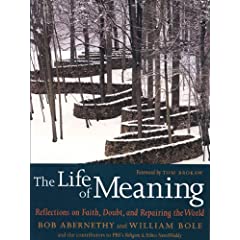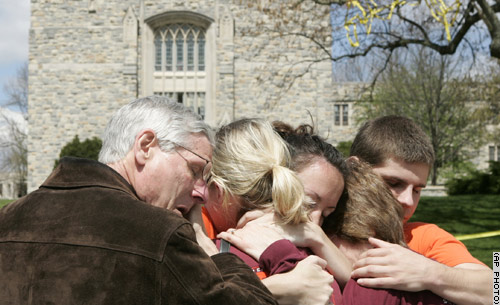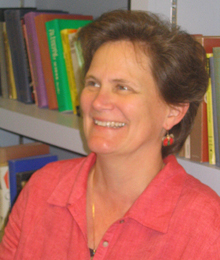Apr
23
Book: Why Horror Attracts, and How We Memorialize It
April 23, 2007 | Leave a Comment
 Bob Abernethy, founder and host of PBS’s Religion and Ethics Newsweekly, and co-editor William Bole have compiled 66 of the show’s most interesting interviews in “The Life of Meaning: Faith, Doubt, and Repairing the World,†published this month by Seven Stories Press. Compressed from lengthy Q+As into “spoken essay†form, the brief chapters offer short bursts of insight. Read today, a week after the Virginia Tech shootings, two of these chapters in particular pose provocative questions about how we relate to public tragedy.
Bob Abernethy, founder and host of PBS’s Religion and Ethics Newsweekly, and co-editor William Bole have compiled 66 of the show’s most interesting interviews in “The Life of Meaning: Faith, Doubt, and Repairing the World,†published this month by Seven Stories Press. Compressed from lengthy Q+As into “spoken essay†form, the brief chapters offer short bursts of insight. Read today, a week after the Virginia Tech shootings, two of these chapters in particular pose provocative questions about how we relate to public tragedy.
In the chapter titled “Staring Down the Gods of War,†Chris Hedges, a former foreign correspondent for The New York Times, tells Religion and Ethics Newsweekly that the intensity of combat can “very swiftly become an addiction….You are thrust into the present in a way that is like a drug. I mean, even the colors are brighter.†The Virginia Tech violence was, in a sense, a three-hour war, Seung-Hui Cho versus the world. And just as war movies, war reenactments and other war mythologizing are perennially popular, so the public has returned again and again to dip into the seemingly endless stream of media content, which now includes portraits of the individual victims, narratives of Cho’s troubling past, and even interactive graphics that retrace the killer’s steps last Monday.
The rush of violence attracts, says Hedges, author of the 2003 book, War Is a Force That Gives Us Meaning. Although he is still traumatized by his memories of the former Yugoslavia and other war zones – unable to sit through the Lord of the Rings movie with his son, for example – he identifies himself with friends from Sarajevo who “sat around at the end of the war, and they didn’t miss the suffering and the death, but they also realized that this was probably the fullest moment in their life. There was a kind of nostalgia for that, a sense of that comradeship, a sense of that excitement. Yet that kind of lifestyle or that kind of rush can probably never be re-created.†The intensity of feeling surrounding memorials for the Virginia Tech victims seems to reflect this same phenomenon: while we are horrified by the violence, we cherish the satisfying, if bittersweet, feeling of solidarity it engenders.
In the chapter “Evil Acts, Sacred Places,†Edward Linenthal, whose insight into the process of memorializing violent mass death is increasingly in demand, tells Religion and Ethics Newsweekly’s managing editor, Kim Lawton, that “an unsettling collective effervescence†follows public tragedies as people focus on and celebrate individual acts of heroism. “Often we fixate on how these catastrophes bring us together when, in fact, they bring us together and tear us apart at the same time,†says Linenthal, a professor of history at Indiana University, Bloomington; a member of the Flight 93 National Memorial Federal Advisory Commission; and an author of books about U.S. battlefields, the Oklahoma City bombing and the U.S. Holocaust Memorial Museum.
Communities often fight over how memorials should be constructed, and Linenthal hints at questions that Virginia Tech community members will soon face: Should Norris Hall, main site of last Monday’s violence, be closed or even destroyed? Who “owns†those classrooms now – the victims’ families, the college, the nation? That type of conflict, Linenthal notes, continues over the
 The Virginia Tech community has already held several official mourning and memorial events; Linenthal says memorializing is a way of containing and eventually moving beyond a tragedy. But he finds a tempting deception in the rush to memorialize: “It may provide us with a much-too-illusory comfort that it is, in fact, over.†Those are chilling words, especially for those who memorialized the Columbine tragedy with the hope that such massive school violence would never happen again. “If we can put it away and say it’s over, it’s very consoling. But we don’t know whether it’s over or not. In a sense, we’re memorializing in the midst.â€
The Virginia Tech community has already held several official mourning and memorial events; Linenthal says memorializing is a way of containing and eventually moving beyond a tragedy. But he finds a tempting deception in the rush to memorialize: “It may provide us with a much-too-illusory comfort that it is, in fact, over.†Those are chilling words, especially for those who memorialized the Columbine tragedy with the hope that such massive school violence would never happen again. “If we can put it away and say it’s over, it’s very consoling. But we don’t know whether it’s over or not. In a sense, we’re memorializing in the midst.â€
Apr
17
Scholar on VTech Tragedy: Theodicy Has Many Faces
April 17, 2007 | Leave a Comment
 Reporting on a tragedy follows a set trajectory, and many reporters today are writing “what sense can we make of it?” stories, often using faith leaders as sources. Over the coming week, the otherwise arcane theological term “theodicy” will crop up in news stories across the country.
Reporting on a tragedy follows a set trajectory, and many reporters today are writing “what sense can we make of it?” stories, often using faith leaders as sources. Over the coming week, the otherwise arcane theological term “theodicy” will crop up in news stories across the country.
To take a deeper look at theodicy, ReligionWriter spoke with Wendy Farley, a professor of religion at Emory University in Atlanta,
Below is an edited Q+A with her. (WARNING: Some Biblical literacy required.)
ReligionWriter: First of all, what is theodicy?
Wendy Farley: It’s a religious attempt to think about the idea that if God is all-powerful and all-good, then how can there be suffering and evil in the world?
RW: Is our modern American understanding of evil and suffering different from that found among people in the Bible?
Farley: There is a range of possible interpretations of theodicy, and almost all of these are found in the Bible. People continue to struggle within that range of possibility.
RW: What is that range?
Farley: The “Zeus” model is God is mad and punishing us, and that’s why we suffer — you can find that idea in the Bible. Then there’s Job, who is an example of innocent suffering. He testifies to God: “Why am I suffering when I am a good man?” God responds by being present to Job, not giving an explanation except the compassionate power of that presence itself.
RW: But God appears in a whirlwind and says, “Job, you weren’t there when I created the earth.” That doesn’t sound very comforting.
Farley: God lays out for Job the incredible beauty and complexity of creation and basically says, “This doesn’t work by small legal views of justice. But I love it all, and I love you.” God gets very angry at Job’s three comforters, who were saying to him, “Just admit that you were bad, and God will forgive you.” God says about them, “That’s not right.” God displays his care for Job in the midst of inevitable suffering.
RW: If you imagine yourself in Job’s situation, sitting on an ash-heap, scraping your sores with a pot shard — just like the Virginia Tech students today, looking around at this tragedy — how can you be a position to feel that loving presence?
Farley: It’s an existentially hard place to be in. It’s a place of terrible suffering. We want answers, that’s the way we’re made. The answer that, “God is in charge, bad things happen but still the world makes sense,” is an existentially powerful answer, and people find that comforting. That’s one of the options of the Bible, it’s one people have kept around for thousands of years, and you find versions of it in most of the religious traditions. It’s just not the only option.
RW: What are the other ways the Bible explain suffering?
Farley: From a Christian point of view, one way is to understand the coming of the Messiah as a continuation of the view of the Book of Job, namely, that God simply comes to us and is present to us. We have in the Passion the deepest possible intimacy of God with unjust suffering. There’s no suffering that we human being experience where God is not present to us. There is nothing, as Paul says, that can separate us from the love of God.
RW: God appeared to Job, but how do you feel the love of God if He doesn’t come to you in the whirlwind?
Farley: We feel it in prayer, we feel it in the care we give one another. Part of the Incarnation is God’s presence to us through each other, as Christ said, “When I was naked, you fed me.” There’s no theodicy that’s going to make it okay for people to suffer. But like most human beings, who have suffered very severely, I can say the presence of God isn’t taken away in suffering. It’s very empowering. Not that it makes you not suffer, but it makes you get through it with a grace and courage and beauty and dignity. We see people going through horrific things and responding with real moral beauty.
RW: Are you happy with the coverage theodicy gets in the press after disasters and tragedies?
Farley: The press doesn’t mediate a deep understanding of these issues. The press does what it’s supposed to do, which is not to be pastoral. I wouldn’t look to the press for a way to navigate tragedy. I do find the press tends to go to conservative ministers [as sources], which is not where I would go for comfort.
RW: You think the press tends to go to conservative sources in order to get a firm answer?
Farley: Probably. You are more likely to get a sound bite.
RW: Here we are on Tuesday, ages away from Sunday morning, and I wonder if people do look for spiritual answers in press reports.
Farley: I’m sure that’s true. That is a little frightening (laughs.) Reporters should be aware there are a variety of faithful ways of responding to suffering and catastrophe.